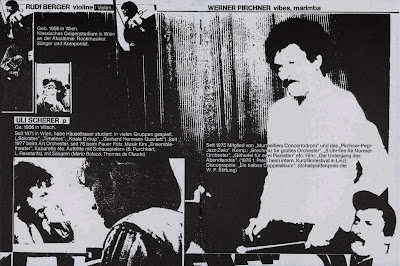Label:
Art Records – 1002
Format:
Vinyl, LP, Album / Country: Austria / Released: 1980
Style:
Contemporary Jazz, Free Improvisation, Free Jazz
Recorded
on the 22/23 Nov. 1979 at the Schmettersound Studio Bisamberg/Vienna.
Design
[Cover] – Herbert Pirchner, Roland Wernbacher
Photography
By – Elisabeth Fleischmann, Herbert Pirchner
Recorded
By – Herbert Kopecky
Mixed
By – Josef Braitenthaller
Producer
– Hans Heinrich C. Stoller, Mathias Rüegg
Distributed
By – Extraplatte
Printed
By – HofmannDruck
Matrix
/ Runout (Side A): X 273 - AR 1002-A
Matrix
/ Runout (Side B): X 274 - AR 1002-B
Rights
Society: Austro Mechana
side 1:
side 1:
A1
- Tango From Obango
........................................................................................
13:27
A2
- Polish Contrasts
.................................................................................................
9:31
A3
- Voila Di Here ......................................................................................................
1:25
side
2:
B1
- The World Of BeBand & BigBop
...................................................................... 12:40
B2
- Panta Rhei .........................................................................................................
5:55
B3
- Charly's Trauma .................................................................................................
0:37
Personnel:
Mathias
Rüegg - arranger, conductor
Lauren
Newton - voice
Karl
Fian - trumpet
Herbert
Joos − flugelhorn, baritone horn
Christian
Radovan − trombone
Wolfgang
Puschnig − alto saxophone, flute
Harry
Sokal - tenor saxophone, soprano saxophone, flute
Roman
Schwaller − tenor saxophone
Uli
Scherer − piano
Harry
Pepl – guitar
Werner
Pirchner − marimba, vibraphone
Jürgen
Wuchner − bass
Fritz
Ozmec − drums
Wolfgang
Reisinger – percussion
The
Vienna Art Orchestra is a 14-member jazz orchestra that features the
avant-garde arrangements and compositions of its leader, pianist Mathias Rüegg.
This LP is a 1980 debut, an important document in the post-modern jazz
movement...
The opening, title track is a joyous, folkish
tango that's been cartoonishly toyed with, featuring three solo sections. The
marimba section is also ornamented with vocalese from Lauren Newton, followed
by an extremely playful horn lead that sounds like a toy instrument. The solo
offering from violinist Rudi Berger has an electronically effected fusion
sound. A tight, alto sax solo by Wolfgang Puschnig ties everything together
neatly with a lengthy, unaccompanied performance. This leads right into a
mellow, tenor sax and marimba introduction to "Polish Contrasts." The
lead here is eventually taken by a bright, cosmic soprano sax (Harry Solkal)...
For a short piano piece, background singing and clapping recorded on the tour
bus serve as a backdrop. Newton brings back her playful scatting, in clear
imitation of a squawking free-jazz sax solo for an a cappella intro to
"The World of Be-Band & Big Bop." After about three minutes, the
instrumentalists slowly materialize behind her until the mad marimba possesses
her. After a full six minutes of amazing scatting, the song itself is introduced
and six more minutes of cross-genre pollination follow.
... Musical
puns and variations on serious themes abound from the orchestra pit, but unlike
Rüegg's Euro counterparts like Franz Koglmann and Stan Tracey, this man has a
sense of where colorization and parody end and a new musical language is
created. In this sense he resembles both Frank Zappa and Willem Breuker, but
uses tradition differently -- not as a guidepost but as a landmark on the way
to someplace else (and Rüegg knows exactly where he's going, judging by his
charts). The man's imagination is the limit because his band can do virtually
anything he dares to dream up...
Truly,
Tango From Obango is an amazing debut from a band that offers more than it
could possibly receive.
(Reviews
by Tom Schulte and Thom Jurek)
If
you find it, buy this album!






















